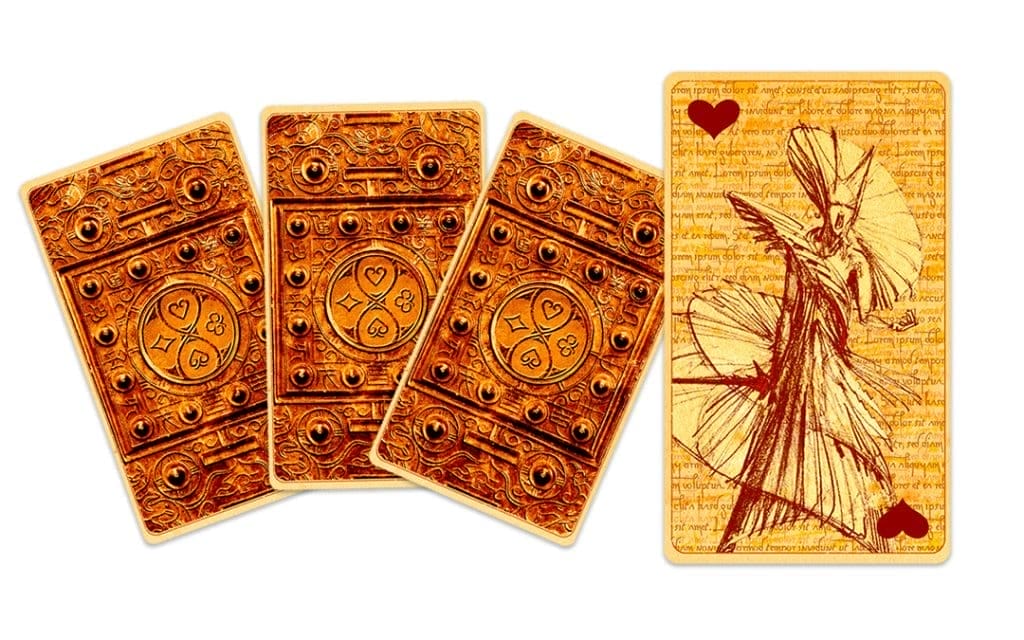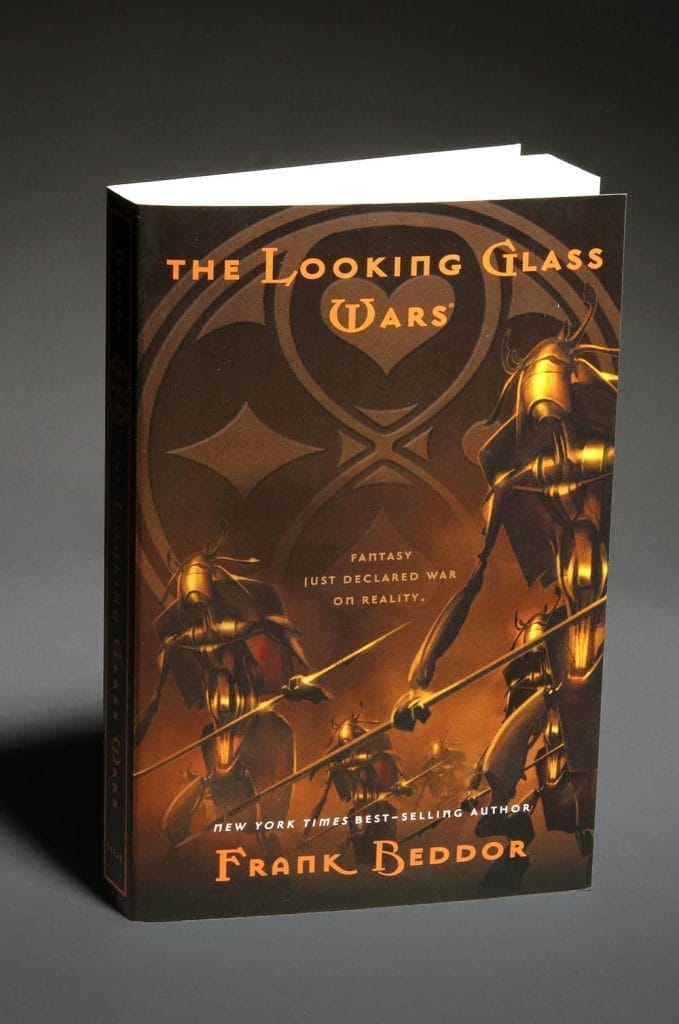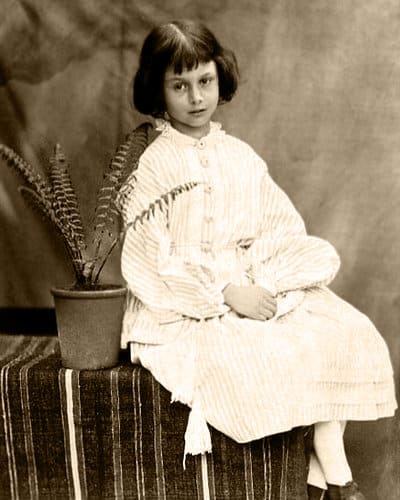BBC Radio Segment – Transcribed
ANNCR:
On today’s “Tracking the Muse” BBC entertainment reporter Jonathan Owens examines a controversial book that purportedly unmasks perhaps the greatest literary lie of all time.
Jonathan Owens:
For generations, Lewis Carroll’s beloved novels, “ALICE’S ADVENTURES IN WONDERLAND” and “THROUGH THE LOOKING-GLASS, AND WHAT ALICE FOUND THERE,” over the years its popularity has only increased, inspiring numerous and varied adaptations in media ranging from stage and film to television and even comic books. During this time, it’s been universally accepted that Carroll, nom de plume for the Reverend Charles Dodgson, invented his classic tale to entertain a seven-year-old friend named Alice Liddell.
However, startling new evidence, brought to light by author Frank Beddor in his explosive novel, “THE LOOKING GLASS WARS” suggests that Lewis Carroll did not tell Alice Liddell the story of Wonderland. Rather, she told him.
Beddor bases his conclusion on a journey that began several years ago in London. In a recent interview with this reporter, the author descripted how he came to uncover the fascinating truth behind the fiction.
Beddor:
“Well, it was while visiting an exhibit of antique playing cards on display at the British Museum, I was drawn to an incomplete deck of cards that seemed to be illuminated by an unusual glow, almost as though the cards were alive. To my amazement, these cards depicted a much darker version of the Alice in Wonderland story. I was so intrigued, that the next morning I headed over to local antique shop specializing in 19th century cards, where I was shocked to learn the dealer possessed the missing cards from the deck! Then he told me an astonishing story: that Alice Liddell was not the girl she appeared to be that she had, in fact, been adopted by the Liddell family and that her real name was Alyss Heart.

Jonathan Owen:
Following the extensive research into the accuracy of these controversial statements, Beddor found himself compelled to expose the truth in “The Looking Glass Wars.” Not everyone was impressed. When asked, Jilly Cooper, best-selling British author of Riders, Rivals and Polo, fumed.
Jilly Cooper:
“It’s a disgrace, of course writers sometimes take stories and legends as inspiration... But to alter the intrinsic nature of the characters is just awful. It’s cheating.”
Likewise, Judith Kerr, the creator of the Mog stories, said:
Judith Kerr:
“I think it’s an absolutely terrible idea to take anything good that someone has written and rewrite it. Words fail me.”
Jonathan Owen:
2005-2007 Children’s Laureate Jacqueline Wilson said it could be brilliant.
Jacqueline Wilson:
“But anybody that says I’m going to re-work Jane Austen or Shakespeare is being very bold and setting themselves up for people to be very iffy. I feel slightly anxious about this because it is so much part of the English literature tradition. When you think of Alice in Wonderland, you think of Oxford and the tradition and when in the same sentence you’re saying video games, I think, maybe not. But nowadays, sadly, I don’t think the average eight-nine-ten-year-old as read Alice.”
Jonathan Owen:
Not all Brits are negative, numerous reviewers are quite impressed with Mr. Beddor’s book. The Times of London, wrote, “This ingenious reworking, is powerful, eventful, and dark. Which is entirely legitimate, given the surreality of the original.” The Independent, called it “Revolutionary.”

Frank Beddor:
“I don’t mind a bit of criticism, if the critic has read my work, for the most part though, these writers haven’t read my book which makes their reaction seem a bit shrill ‘scolding’ for somehow breaking the rules. For instance, when Michael Morpurgo harrumphed. “A storyteller of great originality should not need to take someone’s else template.”
He had not read my book, but after he read it, in an interview on the BBC Radio 4’s Today Programme, Michael conceded he was unnecessarily harsh. “I think the remarkable thing about the book is it’s very vibrant, it’s imaginative, it’s visual, it’s very well researched. What Frank has done is he’s interwoven the history…of Alice and then told his own extraordinary, and believable visual and fast-moving tale.”
“That’s a 180-degree reaction. Thanks for reading Michael!”
“What did surprise me was the power of the Lewis Carroll Society and the intensity of the members.”
Jonathan Owens:
Indeed, you seemed to have ruffled a few feathers at the Lewis Carroll Society. When I spoke with the President of London’s famed Lewis Carroll Society, Reginald Mac Nee, he said: “It’s pure rubbish, a scandalous pack of lies designed to drag the name of one of literature’s greatest geniuses through the mud!” Alan White, Secretary of the Lewis Carroll Society, agrees, although he makes clear this is his opinion, not that of the organization. “Mr. Beddor has not understood Lewis Carroll.”
Frank Beddor:
“Alice has survived many adaptations, I mean, no disrespect to the purist, the original is strong enough it won’t suffer. I’ve only added to Alice’s legacy in pop culture.”
Jonathan Owen:
Varies LCS have resorted to every means in their power, short of book burnings, to stop the spread of the author’s myth-defying revelations.
Frank Beddor:
“A small group of these LCS members are fanatics, when I arrived at Heathrow Airport for a press junket there was a group of them arms linked on the tarmac with a banner declaring, ‘Off with Frank Beddor’s head!’ Shocking! You don’t get that sort of passionate protest in the USA about books.” Politics yes!”
Jonathan Owen:
I asked Brian Viner, (The Independent) should Mr. Beddor or anyone else be allowed to tinker with classic works of literature?
Brian Viner:
“The answer, of course, is a resounding yes. After all, the arch-tinker of classic tales was William Shakespeare, whose play Romeo and Juliet clearly owes something to Ovid’s poem of star-crossed lovers, Pyramus and Thisbe, written in the first century AD. Equally robust questions were asked by some television critics when Andrew Davies, the scarily prodigious adapter of literary classics for the small screen, introduced a bit of racy lesbianism into his version of Vanity Fair. All he was doing was setting the Parallel nearer to sight than to throw it off at a Distance. What Davies was also doing, of course, was chasing ratings-which whatever anybody says, has been the telling going back to a long time before Ovid. So, to bring all this back to the Mad Hatter, the Cheshire Cat and the March Hare, Mr. Beddor can do what he likes to Alice in Wonderland. The original will endure, and the may the best version, original or rewrite, endure longer.”
Jonathan Owens:
The book has another adherent, esteemed scholar and Oxford Professor of History, Colin Clements. He points to several notable facts that support Beddor’s contentions.

Prof Colin Clemens:
Few people are aware, but there does exist a certificate showing Alice/Alyss Liddell was in fact adopted. In addition, there is that damning letter from Alice to Macmillan Publishers complaining about the fictionalization of her life story. But the paper trail does not end there. It is very likely that vital clues and evidence regarding the “Alyss Mystery” were contained within the correspondence and dairies the Rev. Dodgson, a prolific and meticulous diarist, kept throughout his life.
For reasons unknown, members of Charles Dodgson’s family were quick to suppress these vital documents, even resorting to burning many of them after his unexpected and untimely death from pneumonia in 1898. While academics a century later published books and gained tenue by promoting the sordid and simplistic ‘pedophilia theories’ as hidden elements of the burned and missing diaries, perhaps the family’s reason for the destruction of the personal documents was for a much more practical reason. Did Rev. Dodgson disclose the true origins of his wonderland tale? Did the family fear for his literary reputation?
Jonathan Owen:
In addition to drawing the ire of his many critics, Beddor’s literary efforts have also attracted like minded truth seekers. Upon reading The Looking Glass Wars, renowned Astral Traveler and Interstellar author, E.A. Cavalier sensed a kindred spirit in Beddor.
E.A. Cavalier:
“For several years, I have been tracking the myth of Hatter Madigan., (i.e. the Mad Hatter) an other-worldly warrior who appeared in France in 1859 in search of ‘Wonderland’s lost Princess’. He proceeded to crisscross the planet for 13 years until his search successfully ended in London. These events dovetail perfectly with Mr.
Beddor’s findings. When Frank and I compared notes, er realized we both had come upon a story beyond our wildest imaginations and that’s quite far.”
Jonathan Owens:
As always, the verity or falsehood of such important claims must be made on an individual basis. Therefore, we urge our listeners to pick up a copy of “The Looking Glass Wars,” and judge for yourself. You may be persuaded to believe Wonderland really does exist! This is Jonathan Owens for the BBC’s “Tracking the Muse.”